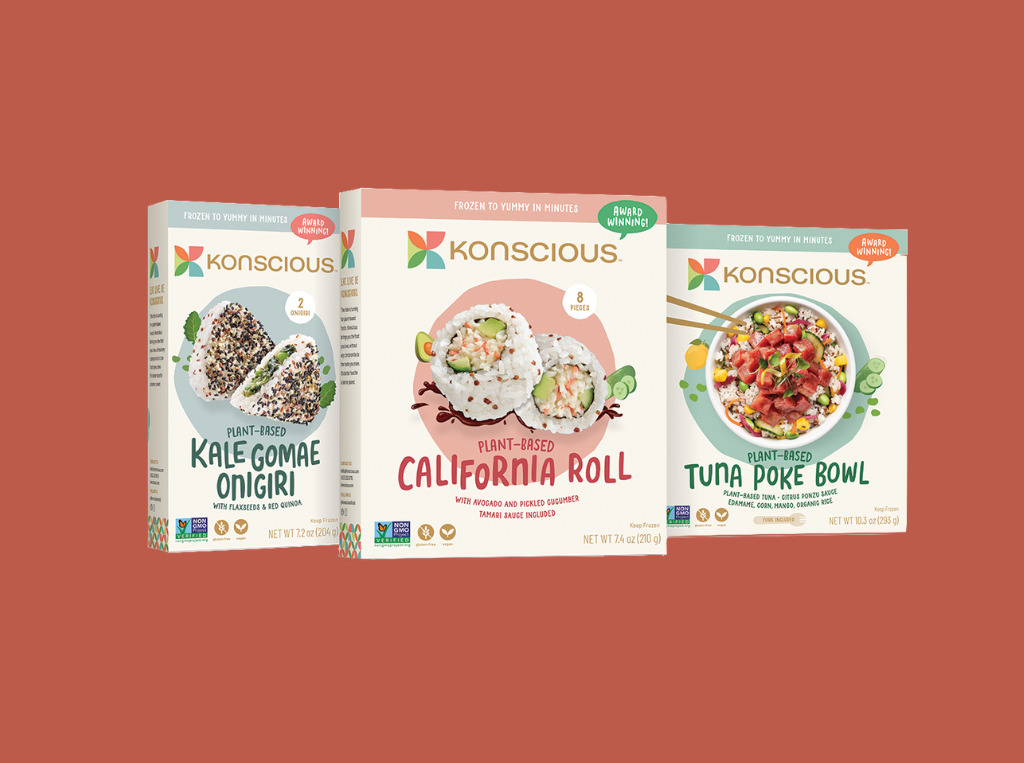Plant-Based Seafood Startup Reels in $26M for Frozen Vegan Sushi & Poke Bowls
3 Mins Read
In yet another sign of the growing popularity of plant-based seafood, Californian frozen vegan sushi brand Konscious Foods has raised $26M in a seed funding round. Founded by French chef Yves Potvin, who also launched Yves Veggie Cuisine and Gardein, the brand’s investors in the financing round included Protein Industries Canada, Zynik Capital and Walter Group.
Launched in 2021, Konscious Foods’ frozen plant-based sushi is a world-first. The brand, which caters to both retail and foodservice, has 10 products across three ranges: sushi rolls, onigiris and poke bowls. The company aims to use the investment to grow its presence – it’s expected to be available in 4,500 stores across the US by the end of 2023 – support operations at its production facility in Vancouver, and deploy marketing initiatives for nationwide retail launches.
“The products offered by Konscious Foods represent a significant shift in the plant-based food space,” said Pierre Somers, chairman and CEO of Walter Group. “It proves that meat alternatives do not need to be highly processed, filled with unnatural ingredients or cost more than the incumbent products. We believe the company will transform plant-based food and the seafood industry.”
Overfishing and the demand for plant-based seafood
“This investment validates our excitement about the demand – and critical need – for seafood made from plants,” said Potvin. “With the rising demand for fish, and subsequent overfishing crisis, we feel it is crucial to have better-for-you, better-for-the-world seafood options that don’t sacrifice taste or texture.”
The seafood industry – much like the meat sector – is heavily industrialised and inundated with sustainability and labour issues. One of the major problems, as Potvin alludes to above, is overfishing, whose operators receive $22B in capacity-enhancing subsidies every year.
Lily Ng, owner of Manhattan-based alt-seafood market Lily’s Vegan Pantry, previously told Green Queen Media: “Overfishing disrupts the food chain. And when populations are diminished, other species will overpopulate, destroying biodiversity and making changes to the entire ecosystem. In the end, our consumption of fish still destroys our planet.”
Overfishing is a response to the growing demand for seafood, which has also exacerbated the industry’s poor climate footprint. Increased greenhouse gas emissions and fuel use by ocean fishery vessels both contribute to this. Additionally, plastic packaging, the presence of microplastics in oceans that get contaminated via toxic chemical runoff, and a history of child and slave labour make the sector an unsavoury prospect for many.
Recent investments and growth of vegan seafood
Konscious Foods is far from the only alt-seafood brand receiving investment this year. In June, German cultivated fish startup Bluu Seafood raised $17.5M in a Series A funding round, and also applied for scientific approval to distribute its products in the US. And last month, Swedish brand Hooked Foods raised about €644,000 via a crowdfunding campaign.
In January, a partnership between Sweden’s Mycroena and Austrian producer Revo Foods received a €1.5M grant from Swedish innovation agency Vinnova, the Austrian Research Promotion Agency, and EU funding programme Eurostars to create 3D-printed mycoprotein to replace seafood.
Meanwhile, eight months after securing vegan seafood brand Good Catch, plant-based giant Wicked Kitchen acquired pioneering alt-seafood startup Current Foods in May, expanding the latter’s foodservice and fine-dining operations in Europe and the US. This comes as no surprise, given the year-on-year growth potential of vegan seafood in US restaurants is 57%.
The plant-based seafood category is relatively small, but as restaurant menus look to be more inclusive and sustainable, it’s a bright spark in the wider vegan industry and a trend that holds tremendous potential.
“The average consumer is becoming more aware of animal welfare and sustainability,” Maarten Garaets, alt-protein managing director of seafood giant Thai Union, told Green Queen Media in May. “And this is becoming a more important part of the selection criteria when they are buying food, but this is still a very small group.”
He added: “Alternative seafood is a new category, with limited awareness, whereas meat is more established. However, seafood is bound to catch up soon. Health is less of a concern for seafood, whereas sustainability will be more of a lever.”



